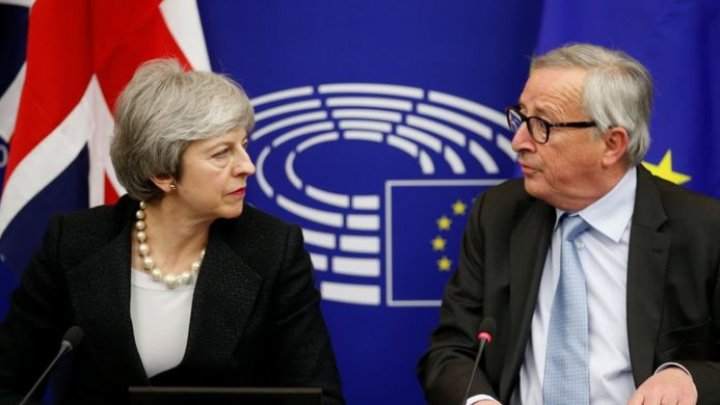Brexit: MPs to vote on Theresa May's Brexit deal
 foto: Theresa May and Jean-Claude Juncker gave a joint press conference after late night talks in Strasbourg/Reuters
foto: Theresa May and Jean-Claude Juncker gave a joint press conference after late night talks in Strasbourg/Reuters
MPs will vote on Theresa May's Brexit deal later after she says she secured "legally binding" changes following last-minute talks with the EU.
The PM said the changes meant the Irish backstop - the insurance policy designed to avoid a hard border in Ireland - could not "become permanent".
Attorney General Geoffrey Cox's updated legal advice is seen as crucial if the DUP and Tory Brexiteers are to back it.
Labour said the PM had secured nothing new and they would vote against.
The last time Mrs May's withdrawal agreement was put to Parliament in January, it was voted down by a margin of 230.
The BBC's political editor Laura Kuenssberg said it would be a "political miracle of historic proportions" if Mrs May could overturn such a heavy defeat.
She said the legal arguments were set to "rage" all day, with Mr Cox due to publish his revised opinion on whether the UK will be able to leave the backstop or if the arrangement, as he concluded in December, could "endure indefinitely".
The government's senior law officer has strongly dismissed suggestions he told ministers on Monday that his view had not changed and he had been told to go away and think again.
Two documents were agreed after Mrs May flew to the European Parliament with Brexit Secretary Steve Barclay for last-minute talks with Mr Juncker and EU chief Brexit negotiator Michel Barnier.
The first is a "joint legally binding instrument" on the withdrawal agreement which the UK could use to start a "formal dispute" against the EU if it tried to keep the UK tied into the backstop indefinitely.
The other is a joint statement about the UK and EU's future relationship which commits to replacing the backstop with an alternative by December 2020.
Many MPs fear the backstop would keep the UK in a customs arrangement with the EU indefinitely.
After talks with Mr Juncker, the prime minister said she "passionately believed" the new assurances addressed their concerns.
"MPs were clear that legal changes were needed to the backstop. Today we have secured legal changes," she said. "Now is the time to come together to back this improved Brexit deal."
The Democratic Unionist Party, whose support Mrs May relies on in the Commons, said it would be "scrutinising the text line by line" before deciding whether to back the deal.
The Irish Prime Minister Leo Varadkar said the new agreements showed both sides' "good faith" - although he made clear they did "not undermine" the principle of the backstop or how it might come into force.
Ex-Brexit Secretary David Davis has indicated he might be willing to support the deal if Mr Cox endorsed it, telling LBC if the attorney said it had legal force, it might "make this just about acceptable to me".
Jacob Rees-Mogg, who chairs the influential European Research Group of MPs, said Mr Cox's views and those of the group's own lawyers were critical but essentially it was a political judgement for MPs.
"Does this deliver enough of Brexit to make this worth accepting?" he told the BBC.
Monday morning government blues have been replaced by Tuesday morning nervous hopes.
The government does not suddenly expect its Brexit deal to be ushered through at speed, cheered on by well-wishers.
It does, however, believe that Monday night's double act in Strasbourg by Theresa May and Jean Claude Juncker puts it, to quote one cabinet minister, "back in the races".
The extra assurances wrought from weeks of talks with the EU will move some of the prime minister's objectors from the "no" column to the "yes".
Mr Juncker has warned MPs they would be putting everything at risk if they voted down the deal.
"In politics sometimes you get a second chance," he said. "It is what we do with that second chance that counts. There will be no third chance."
Environment Secretary Michael Gove echoed this message, telling MPs "if you don't take this prize, there is the real risk of you will see a diluted, softer or less palatable Brexit deal".
Ministers have insisted the documents agreed would "strengthen and improve" both the withdrawal agreement from the EU and the political declaration on the future relationship.
Another document has also been put forward by the government, known as a "unilateral declaration".
This outlines the UK's position that there is nothing to prevent it from leaving the backstop arrangement if discussions on a future relationship with the EU break down and there is no prospect of an agreement.